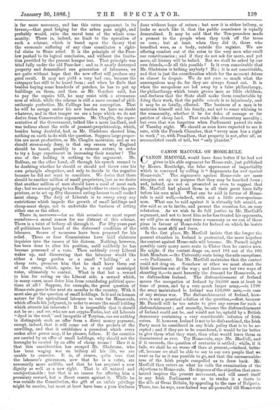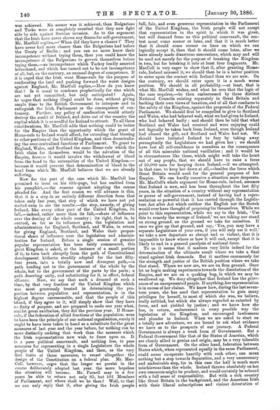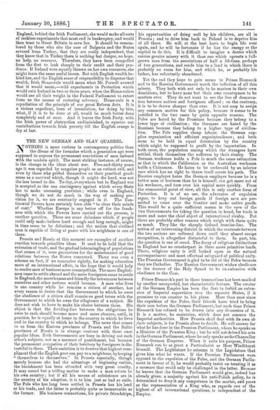CANON MACCOLL ON HOME-RULE.
OANON MACCOLL would have done better if he had not given to his able argument for Home-rule, just published by Messrs. Routledge, the false appearance of impartiality
which is conveyed by calling it " Arguments for and against Home-rule." The arguments against Home-rule are mete ninepins set up on purpose that they may be knocked down ; and, indeed, are not so presented as even to suggest that Mr. McColl had placed them in all their great force fully
before his own mind. What can be said in favour of Home- rule is said well,—indeed, with not a little over-specious- ness. What can be said against it is virtually left unsaid, or else said so as to invite, and present the occasion for an easy refutation. As we wish to do full justice to Mr. for, argument, and not to treat him as he has treated his opponents, we will give as strong and terse a summary as we can of those pleas in favour of Home-rule for Ireland on which Ire insists with the most skill and free.
In the first place, Mr. MacColl insists that the longer the present situation in Ireland is protracted, the more hopeless the contest against Home-rule will become. Mr. Parnell might possibly Carry many more seats in Ulster than he carries now. He might, if the contest drags on, send 101 out of the 103 Irish Members,—the University seats being the sole exceptions, —to Parliament. But Mr. MacColl maintains that the contest could not drag on. Somehow or other we must shunt the Irish Qtrestion out of the way ; and there are but two ways of shunting it,—to meet honeetly the demand for Home-rule, or to disfranchise Ireland. The disfranchisement of Ireland means the occupation Of Ireland by 50,000 men at least in time of peace, and by a very much larger army,—in 1798 the army maintained in Ireland was 150,000 men,—in case of any Serious war. The disfranchisement of Ireland, how- ever, is not a practical sahation of the question,—first, because Mr. Parnell will be too astute to give any erease for such a disfranchisement ; and secondly, because the disfranchisement of Ireland could not be, and would not be, upheld by a British deniocraey containing a very considerable infusion of Irish voters. If, however, Ireland is not to be disfranchised, the Irish Party must be considered in any Irish policy that is to be ac- cepted; and if they are to he considered, it would be far better to give them what they want, than what would leave theta as discontented as ever. Try floe-rule, says Mr. MacColl, and if it succeeds, the question Of centuries is settled ; while, if it fails, we shall be no worse off than at present,—indeed, better off, because we shall be able to say to our ovte people that we went as far as it was possible to go, and that the unreasonable- ness of the Irish people compelled us to draw back. Mr. MacColl then enters on what he eal/s the eninination of the objections to Home-rule. He disposes of the objection that race- hatred inspires the present movement, and till used itself in any Irish Parliament so as to ithaer it a thorn in the side of Great Britain, by appealing Ic the Cinse of Bulgaria. There, too, he gays, race-hatred was all-powerful till Home-rule was achieved. No sooner was it achieved, than Bulgarians and Turks were so completely reunited that they now fight side by side against Servian invasion. As to the argument that the Irish have never shown any fitness for self-government, Mr. MacColl replies,—' When did they have a chance They have never had more chance than the Bulgarians had before the Treaty of Berlin ; and you can no more know their incompetence without trying them, than you could know the incompetence of the Bulgarians to govern themselves before trying them,—an incompetence which Turkey loudly asserted beforehand, and which has turned out to be not incompetence at all, but, on the contrary, an unusual degree of competence. If it is urged that the Irish want Home-rule for the purpose of confiscating the land and pushing forward the worst designs against England, Mr. MacColl replies,—How do you know that ? Is it usual to condemn prophetically for sins which are not yet committed, but only anticipated ? Again, he urges that nothing illegal could be done, without giving ample time to the British Government to interpose and to extinguish Use Irish Parliament as the consequence of con- tumacy. Further, any policy of confiscation would utterly destroy the credit of Ireland, and drive out of the country the capital which it is so needful for Ireland to attract. To all these considerations, Mr. MacColl adds that nothing could be better for the Empire than the opportunity which the grant of Home-rule to Ireland would afford, for extending that blessing to other portions of the United Kingdom, and thus decentralis- ing the over-centralised functions of Parliament. To grant to England, Wales, and Scotland the same Home-rule which the Irish claim for themselves, would be the salvation of the Empire, because it would involve the withdrawal of blood from the head to the extremities of the United Kingdom,— because it would prevent that determination of blood to the head from which Mr. MacColl believes that we are already suffering.
Now for the part of the case which Mr. hfacColl has promised to treat on his title-page, but has omitted from his pamphlet,---the reasons against adopting the course pleaded for. And the first reason we will advance is this, that it is a step in an entirely different direction from that taken only last year, that step of which we have not yet waited even to see the results,—the step, namely, of giving Ireland, like every other past of the United Kingdom, its full,—indeed, rather more than its full,—share of influence over the destiny of the whole country ; its right, that is, to control, so far as its influence goes, the legislation and administration for England, Scotland, and Wales, in return for giving England, Scotland, and Wales their propor- tional share of influence over the legislation and adminis- tration for Ireland. Before a single session of genuine popular representation has been fairly commenced, this great Kingdom is asked, at the instance of a small portion of it, to turn back abruptly from the path of Constitutional development hitherto steadily adopted for the last fifty- four years, into a totally new and divergent path,—a path tending not to the government of the whole by the whole, but to the government of the parts by the parts ; a path deserting unity, and substituting for it, in effect, federal alliance. Now, we say that such a demand at such a time, by that very fraction of the United Kingdom which was most generously treated in determining the pro- portion between population and representation, is in the highest degree unreasonable, and that the people of this
island, if they agree to it, will simply show that they have no fixity of purpose, and are prepared to undo one year what,
amidst great exultation, they did the previous year. If Home- rule, if the federation of allied fractions of the population, were to have been the principle of our national organisation, surely it ought to have been taken in hand as a substitute for the great measures of last year and the year before, for nothing can be more distinctly undoing that work than the measure which the Irish representatives now wish to force upon us. It is a pure political somersault, and nothing less, to pass measures for representing in a single Legislature the whole
people of the United Kingdom, and then, as the very
first fruits of those measures, to recast altogether the design of the Constitution on a federal plan. Mr. Mac- Coll, however, urges that the longer we persist in the course deliberately adopted last year, the more hopeless the situation will become. Mr. Parnell may in a few years be able to return not only 85, but 101 Members of Parliament, and where shall we be then? Well, to that we can only reply that if, after giving the Irish people fall, fair, and even generous representation in the Parliament of the United Kingdom, the Irish people will not accept that representation in the spirit in which it was given, but will demand from us this political somersault, the con- test must come sooner or later, and that it is much better that it should come sooner on lines on which we can logically accept it, than that it should come later, after we have already made disastrous concessions, which may and will be used not merely for the purpose of breaking the Kingdom in two, but for breaking it into at least four fragments. Mr. MacColl is very eager to show that if, after granting Home- rule, Ireland misused it, we should then be in a better position to enter upon the contest with Ireland than we are now. On the contrary, we should enter upon it in a much worse position. We should in all probability,—at least, that is what Mr. MacColl wishes, and what he sees that the logic of the case requires,—be then embarrassed by three distinct National Councils existing separately in Great Britain and backing their own views of taxation, and of all that conduces to the safety of the Kingdom, against the proposals of the Federal Parliament. We should first be compelled to give to Scotland and Wales, who had behaved well, what we had given to Ireland, who had behaved badly ; and should then be told that what Scotland and Wales had received and were enjoying could not logically be taken back from Ireland, even though Ireland had abused the gift, and Scotland and Wales had not. We should have irritated Ireland to fury by taking away peremptorily the Legislature we had given her ; we should have lost all self-confidence in ourselves as the consequence of all this miserable national vacillation ; and it would be in circumstances like these, which might well take the heart out of any people, that we should have to raise a force of 50,000 men for keeping down Ireland,—if we attempted, in that case, to keep her down at all,—besides the force which Great Britain would need for the general purposes of her Empire. We can hardly conceive a situation more desperate. Mr. MacColl's whole argument for Home-rule, indeed, assumes that Ireland is now, and has been throughout the last fifty years, in the situation of a country without any representation or power of self-government, instead of having had a repre- sentation so powerful that it has carried through the Legisla- ture Act after Act which neither the English nor the Scotch would ever have thought of proposing for themselves. While we point to this representation, while we say to the Irish, Use this to remedy the wrongs of Ireland,' we are taking our stand on strong ground, on the ground we take for ourselves. If once we give up that ground, and say, Yes, you may have a separate Legislature of your own, if you will only use it well,' we take a new departure so abrupt and so violent, that it is impossible to know where or how it will end, except that it is likely to end in a general paralysis of national force.
To us it seems that it matters very little indeed for the determination of the ultimate result where we take a final stand against Irish demands. But it matters enormously for the strength and justice of the British position where we take that stand. Where we now are, we are on firm ground. Once let us begin making experiments towards the dissolution of the Empire, and we are on a quaking bog, in which we may be swallowed up. We deny altogether that Ireland has the griev- ances of an unrepresented people. If anything, her representation is in excess of her claims. We know how, during the last seven- teen years, she has used that representation to gain many privileges for herself, to most of which she was, we believe, really entitled, but which she always regarded as extorted by force, and not yielded by justice ; and we know how she has, in return, embarrassed in every possible way the legislation of the Kingdom, and encouraged lawlessness and plunder in Ireland. When we are asked to start on a totally new adventure, we are bound to ask what evidence we have as to the prospects of our journey. A Federal Government is always a weak form of Government. But a Federal Government like that of the States of America, which are closely allied in genius and origin, may be a very tolerable form of Government. On the other hand, federation between States which, when represented equally in the same Parliament, could never co-operate heartily with each other, can mean nothing but a step towards Separation, and a very unnecessary and undesirable step, for in this case the half is much more mischievous than the whole. Ireland thrown absolutely on her own resources might be prudent, and would certainly be sobered with a full sense of responsibility. But with a rich country like Great Britain in the background, and the American Irish with their liberal subscriptions and violent detestation of
England, behind the Irish Parliament, she would make all sorts of reckless experiments that must end in bankruptcy, and would then trust to Great Britain to save her. It should be remem- bered by those who cite the case of Bulgaria and the States severed from Turkey, that they are really independent, that they know that in Turkey there is nothing but danger, no hope, no help, no resource. Therefore, they have been compelled from the first to look sharply to their credit and their pru- dence. If Ireland were equally thrown on her own resources, she might learn the same useful lesson. But with English wealth be- hind her, and the English sense of responsibility to dispense that wealth, Irish Home-rule would mean what Mr. Parnell avowed that it would mean,—wild experiments in Protection which would ruin Ireland in two or three years, when the Home-rulers would use all their weight in the Federal Parliament to extort from us the means of restoring solvency. Home-rule is a repudiation of the principle of our great Reform Acts. It is a vicious expedient, born of irresolution, for doing by bits, what, if it is to be done at all, would be much better done completely and at once. And it leaves the Irish Party, with the Irish power of obstruction undiminished, to squeeze out contributions towards Irish poverty till the English orange is dry at last.




































 Previous page
Previous page